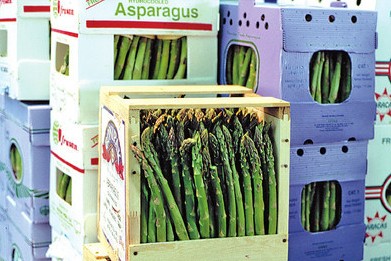By James Booth
Belmont’s Climate Action Roadmap focuses on promoting electrification of vehicles and heat-pump heating, coupled with carbon-free electricity. For an individual Belmont resident, is it enough to convert to clean electricity to help fight climate change? No. Here’s why:
First, in addition to shifting our energy use to clean electricity, it will remain as important as ever to take every opportunity to use less energy through conservation and efficiency, as discussed elsewhere in this newsletter. This includes walking, biking, carpooling, and taking public transit when possible to move ourselves around. Weatherizing our houses to stay comfortable with less energy use and buying efficient appliances remain relevant as well.

Buying imported foods, such as asparagus flown in across continents, is among the many daily choices we each make regarding our individual carbon footprint. (Creative Commons photo)
Moreover, the scope of the emissions considered in the Roadmap is important to note. The inventory of Belmont’s CO2 emissions encompasses only direct emissions of carbon pollution, that is, the combustion of fossil fuels in vehicles registered here in Belmont or buildings located in Belmont, or for generating the electricity used in Belmont. However, the choices that residents make every day also have many effects, some more direct than others, on carbon emissions that happen outside Belmont. For one thing, everything we purchase—food, clothing, household items—has an associated carbon footprint incurred during its long path to market. Decisions about cars and home heating are typically the most important in the overall picture of emissions (in part because they affect emissions over the many-year lifespan of the vehicle or heating system), but Belmont residents can make other decisions to reduce their impact on the climate. Here are a few:
Air travel
In terms of emissions over which individuals have a large degree of personal control, the most significant emissions that lie outside of the scope of the town’s carbon inventory are probably those associated with air travel. Flying has considerable climate impacts. Air travel accounts for a small percentage of global CO2 emissions, but since very few people do most of the flying, flights can still account for a significant fraction of an individual’s carbon footprint. Indeed, for frequent flyers, the emissions resulting from their flights likely exceed the emissions that result from fossil fuel use in their homes and cars. An example: an individual round-trip flight to California results in climate impacts equivalent to emissions of around a ton of CO2. The emissions from a few such flights would be in the same ballpark as the emissions from heating a house with natural gas or driving a gasoline-powered car for an entire year. Choosing to fly less is a key decision that individuals can make to reduce their overall climate impact.
Waste
Belmont currently sends its waste out of town for incineration. The heat produced is used for electricity generation, which provides some economic benefit, but CO2 emissions also result. Reducing waste by choosing products with less packaging will decrease these emissions, as will recycling and composting.
Food choices
Our food choices can increase emissions from the agricultural sector. Demand for produce that is transported over vast distances by air freight (e.g., asparagus flown from Peru in the winter) has a large associated carbon footprint; production of beef and lamb also has a large climate impact. Being conscious of the origins of your food can help reduce emissions.
Political involvement
Finally, thinking about one’s own carbon footprint is only part of the picture. Climate-friendly policies are needed on the local, state, and federal levels. For such policies, such as carbon pricing, to be enacted we will all need to engage in the political process to demand them. Citizens need to be informing themselves, voting for legislators who support strong action on climate, and letting their representatives know that decarbonization is a priority. Reducing one’s personal carbon footprint should be a complement, not an alternative, to the political involvement that is necessary to achieve broad structural changes.
James Booth is a member of the Belmont Energy Committee, a co-author of its Climate Action Roadmap, and a HeatSmart Belmont coach.


Sorry, the comment form is closed at this time.